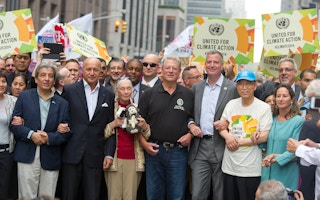Watching the developments at the recent United Nations climate summit unfold from Asia, I was struck by UN chief Ban Ki-moon’s optimism, which shone through all the grand posturing and speeches delivered over the course of the week.
To continue reading, subscribe to Eco‑Business.
There's something for everyone. We offer a range of subscription plans.
- Access our stories and receive our Insights Weekly newsletter with the free EB Member plan.
- Unlock unlimited access to our content and archive with EB Circle.
- Publish your content with EB Premium.
Declaring that the meeting had delivered, the UN secretary-general pointed to all the commitment and pledges made by government and business leaders as proof: financing for the Green Climate Fund, commitment from a coalition to mobilize US$200 billion for low-carbon and climate-resilient development, the doubling of the green bonds market, and the support for carbon pricing by major companies, among other pledges.
Critics say this isn’t enough. After all, we’ve had a slew of sobering news recently. The World Meteorological Organisation last month reported that greenhouse gas emissions reached a record last year, and that our oceans are acidifying faster than at any time in the last 300 million years. This will have far-reaching ramifications on our global supply chain.
WWF also reported that the planet has lost half of its wildlife in the past 40 years due to human threats. Its Living Planet Report says that the majority of high-income countries are increasingly consuming more per person than the planet can accommodate.
It is therefore useful that meetings like the UN climate summit help keep climate action in sharp focus and at the top of the global agenda. There is growing momentum in the business world to take sustainability seriously, and this is increasingly evident in Asia, where a recent Accenture report observed that 76 per cent of Asian CEOs expect sustainability to transform their industries within the next five years.
There are encouraging signs that corporate Asia is awakening to the benefits of understanding and applying corporate sustainability to business strategies – and to the pitfalls of choosing to ignore it.
The high-profile Rana Plaza factory collapse in Bangladesh last year which killed 1,100 garment industry workers linked to western brands such as UK’s Primark and Italy’s Benetton, and the exposed slavery earlier this year in Thailand’s prawn industry, which supplies supermarket giants like Tesco and Carrefour, demonstrate that global supply chain issues go beyond national boundaries and can damage reputable brands overnight.
In other words, CEOs are realising that doing good business is good for business.This is why Eco-Business has adopted a new tagline, The Future of Good Business, which encapsulates our mission in writing about the companies and governments that are leading the way and advancing dialogue about this global shift towards a new form of capitalism.
In a new issue of the Eco-Business magazine published today, we provide a snapshot of the state of responsible business in Asia in the run-up to the Responsible Business Forum on Sustainable Development to be held in Singapore next month. As the leading event on sustainable business in the region, the forum will convene regional business, government and civic society leaders to discuss why it is important that businesses re-think the way they operate and how to redefine the age-old Asian concept of prosperity.
We also look at the pace of change that is gripping Asia’s energy landscape and look forward to the inaugural Asia Clean Energy Summit taking place at the end of this month, which will seek to discuss ways to accelerate Asia’s path to renewable energy.
This issue features some in-depth interviews with industry heavyweights such as ‘Creating Shared Value’ co-creator Mark Kramer, World Business Council for Sustainable Development senior advisor and special envoy of energy and climate change Philippe Joubert, and Forum for the Future Asia Pacific executive director Stephanie Draper, and op-eds on a diverse range of topics from cleantech jobs to life in a ‘degrowth economy‘.
We hope you will enjoy this issue as much as we did putting it together. Meanwhile, stay tuned as we continue to bring you reports on global developments in this space, especially in the lead up to the UNFCCC meeting in Lima, Peru, and what it means for business.











